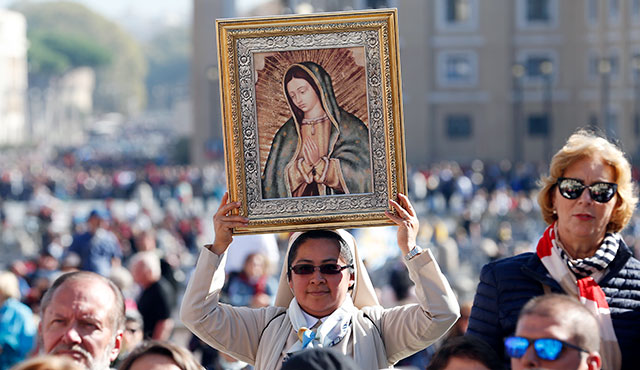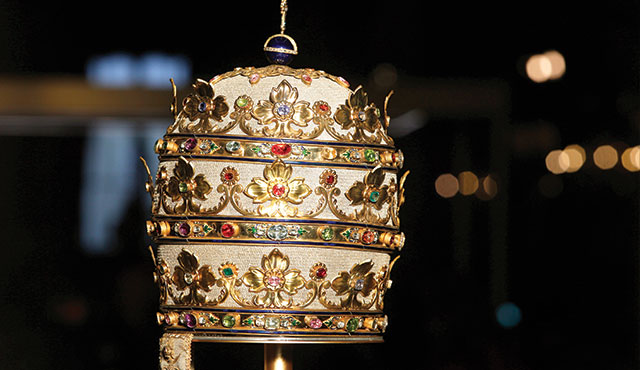There once was a young boy in Italy named Giovanni who dreamed of serving the pope as a papal guard. He was enraptured by their stoicism and alertness, their loyalty and prowess. That is exactly what Giovanni wanted to do with his life, too.
But Giovanni also was an epileptic. And time and again his condition and seizures forced him to curtail his dreams.
It was epilepsy that forced Giovanni, a promising student, to leave Saint Michael’s School before he could properly finish. It was epilepsy that forced Giovanni to abandon his ardent dream of serving his sovereign and spiritual leader in the Papal Noble Guard. And while the actual reasons are not entirely clear, epilepsy may have contributed in Giovanni breaking off his planned marriage to a woman from Ireland…on the wedding day itself.
There was another career path waiting patiently for the frustrated young man, but Giovanni worried that the priesthood, too, would be off limits. He confessed this fear to none other than the pope himself. Pius VII was no stranger to adversity: he endured imprisonment by none other than Napoleon Bonaparte, and lived to tell about it. The pope gave Giovanni some spiritual advice: “Renounce yourself and place yourself in the hands of the Madonna. Call out to her, ‘Save me!’ The Virgin of Nazareth is your future.”
With his own mother, Giovanni followed the pontiff’s directive and made a pilgrimage to the nearby shrine of Our Lady of Loreto on Italy’s Adriatic coast. In prayer, he threw himself at the feet of the Blessed Mother. “Mother, behold your child. Sick, miserable, useless. I am the shame of my family and disgust to myself. I dedicate myself to you. Save me! Immaculata, make me clean!”
Pope Pius VII gave a dispensation to Giovanni — epilepsy would not stop Giovanni from the priesthood. He was ordained at the age of 27. Shortly after his ordination, following his participation in a Vatican delegation to Chile and Peru, Fr. Giovanni was appointed director of the Hospice of San Michele in Rome. And in 1846, Fr. Giovanni was elected Pope Pius IX.
On December 8, 1854, Pius IX declared as dogma the doctrine of the Immaculate Conception, that the Mother of God was totally free of sin from the moment of her conception.
Dr. Joseph Sirven, MD, associate professor of neurology at the Mayo Clinic in Arizona, found the story of young Giovanni’s perseverance so inspiring he led a research team from the Mayo Clinic, Library of Congress, and Vatican Library to study how epilepsy affected the pope. The team’s findings were published in the paper, “Seizures Among Public Figures: Lessons Learned From the Epilepsy of Pope Pius IX.”
“As a Catholic neurologist who specializes in epilepsy, I always read that Pope Pius IX had seizures and epilepsy; yet I did not know his story,” Dr. Sirven told Orange County Catholic. “As I care for many patients who are looking for hope and inspiration, I decided to look into the story and publish what I learned on the journey. I was not disappointed.”
Dr. Sirven believed defining the Immaculate Conception as dogma was the ultimate act of thanksgiving from someone who begged the Virgin Mary for help in overcoming his epilepsy. “I wanted to know more about the man who had seizures as a young person and yet become one of the most consequential popes in the history of the Church.” Indeed, aside from Saint Peter, Pius IX is the longest reigning pope (nearly 32 years). He was declared Blessed by John Paul II in 2000.
“[E]pilepsy is known as the ‘sacred disease’ because many who have been afflicted describe the seizures at times in mystical language,” Dr. Sirven said. 65 million people globally have epilepsy. It is calculated that 1 in 26 people will develop epilepsy during their lifetime.
Dr. Sirven saw in the story of Giovanni a story of hope. “The prime lesson that I take away from this story is that diseases or conditions like epilepsy should not and cannot deter people from reaching whatever purpose is intended for them, including becoming pope,” he said. The neurologist concluded, “I am left with the phrase, ‘God works in mysterious ways.’”


